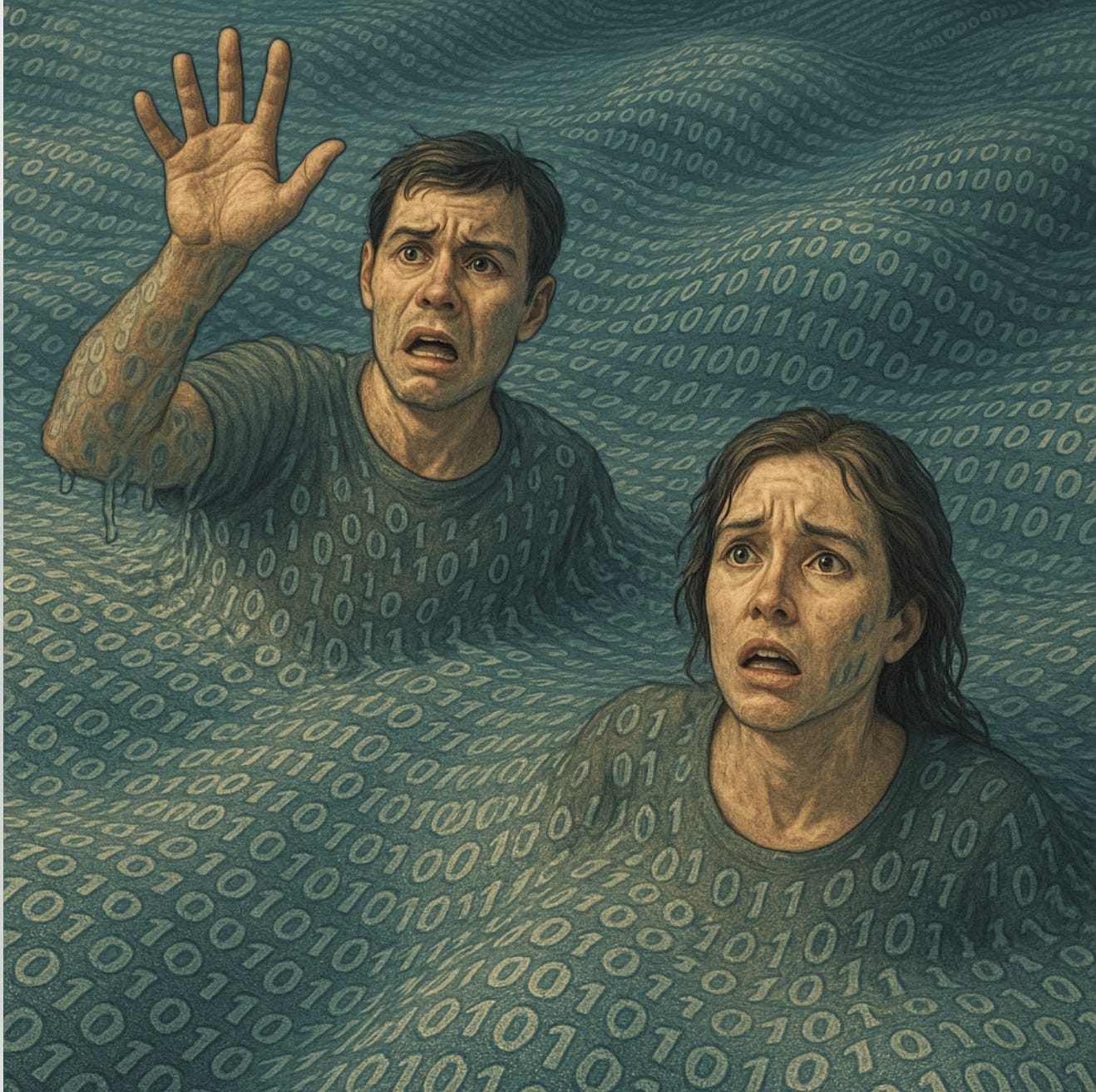From Knowledge Navigator to Digital Fools - 2
More unconventional history on the many ways to get lost digitally
What to do on the Day after the Day of the Dead: Finish off my two part article on the 8 major changes that created digital quicksand, started over 2 months ago. A lifetime has happened since then, with meaningful shifts in values, perceptions, and priorities for me.
In that time more friends and colleagues have been lost inside the technology fabric of our time. I invite you to revisit the first two articles in this particular series, which appears from my notes - really checking my OneNote - could last until mid-2026 even with a return to a biweekly cadence. I also encourage readers to watch the Knowledge Navigator video found in the Part 1 of this article.
“There is no ‘me.’ There is only ‘us.’ One mind.”
The Borg Queen
I continue to see many people, most with little real knowledge or deep understanding of technology, personal or organizational change, or technological history suddenly writing about these topics with the full throated roar only found on the upper left part of the Dunning-Kruger curve. This is just one of so many effects caused by the 8 changes I have identified that have buried so many of us in digital quicksand.
But I have read some interesting articles about the movement from text to moving image; from book to screen; from literacy to post-literacy. I think that these perspectives add significantly to our current discussion. Despite this I believe they miss other pervasive behavioural effects caused by technological change. I will outline the final four changes in this article before undertaking the important but laborious process of highlighting all of these detrimental effects. That will likely take a number of articles.
One note of immense irony: This AI image generated from the briefest of prompts shows looks of horror and consternation on the faces of these people when in actually fact I mostly see cheerful countenances of the newly Borged.
The underlying laws: From Moore to Huang
Imagine for a moment we are all on one large stage. Underneath the stage, hanging in the rafters, and present in both wings is what I pejoratively call iron: the mostly and increasingly invisible infrastructure that has been powering all of these changes for forty years. And many before.
Moore’s Law, a rule of thumb from the dinosaur era of computing says that processor speed roughly doubles every 18 months. This means you can do more. And more. We never tire of more.
Well there exists a subset of people who believe we live in a time of planned obsolescence that they do not want to participate in. They claim not to need any of the upsides of this continuous stream of technological innovation, while watching a brilliant resolution stream of a football game from half a world away.
There is a much stronger set of laws of physics that says at some point you just can’t cram more transistors onto a piece of silicon so we will reach of maximum. Stepping forward with a new law is the perpetually leather garbed CEO of Nvidia - Jensen Huang - the chip firm most associated with the current wave of Artificial Intelligence we now have. You need massive amount of networked chips to get AI to work, and the GPU chips behind them are improving massively faster than Moore’s law would predict, based on factors such as architectures and algorithms.
The key to so many of our new capabilities is not software but rather the surrounding horsepower in every part of our technology ecosystem. AI is part of our lives in 2025 mostly due to advances chip speeds that are breath-taking when applied to the recent Transformer neural network architecture. Speed is behind everything, although the elimination of physical wires through astounding telecommunications advances is another key factor.
WHAT IT BROUGHT
Mobility and freedom as our wired tethers disappeared
Continuous and dynamic improvements in price / performance: so much more for a diminishing price
The protoplasm for the ongoing and never-ending technology change
WHAT IT WROUGHT
Continued increase in a sense of complete entitlement: why can’t it do that astonishing thing - like 4K streaming game 7 of the World Series on a smart phone - that should cost only $99?
MY LASTING THOUGHT
The belief of governments all over the world that getting into the data centre game (with its equal commitment to large power generation) is giving them a leg up in AI as a dominance game. Iron has always been a commodity mug’s game.
LOST SOULS
Even more techies who monitor all of the detailed technical metrics of each technology component, which at this point is very large.
The Smart Pipsqueak that demanded a cloud
The answer to the question I posed: What key thing did Knowledge Navigator miss? This is it; the linchpin. SIZE. This is the biggest driver of the 8 changes. By far. Starting with the innocuous ipod for music (replacing the analog Walkman with a digital version) ultimate portability meant it was always with you.
Always with you.
As technology changed we simply ADDED more capabilities inside WHILE KEEPING IT SMALL. I am convinced that if this hadn’t have happened many of the negative behavioural effects would have been muted. If it was the size of the average laptop and somewhat heavier, I invite you to think of how many things would be different.
A little story: In late 2008 I bought a couple of friends some drinks after work. The guy had the absolute latest iPhone, likely the 3G. He was berserk for it! My female friend was the same, similarly exhorting me in the strongest terms to get one (she is now a minimalist especially for the Tools of Digital Foolery, described below ). I asked them what they did on it. They showed me. I evaluated technology, as I had for decades: as a tool that had features that may or may not be useful to the lifestyle I have chosen. (This is part of the antidotes coming in the last article). THey showed me a couple things of mild interest especially that I might find more useful apps in the app store. But I was still more than a year from actually buying one.
Of course this little gizmo needed three things to make it indispensable: an invisible place to store a lot of stuff, useful apps that were cheap or free, and fast, easy connection to everything on the internet. Which happened in short order.
WHAT IT BROUGHT
Ubiquity
Constancy of use
From behavioural economics we have : What get reminded gets done. It is there reminding you to use it
Huge segments of the world’s population never had the experience of desktop / laptop computers, last generation applications, printers, and the like. They jumped right into the smart phone generation
WHAT IT WROUGHT
What was once private - listening to music, watching TV or videos, talking to people - enters the public sphere because it is always with you
MY LASTING THOUGHT
That it is THE major driver of any current concerns about not having enough time. We aren’t working more or expecting more at work or our lives or so much more complex than the past. We are staring into tiny screens more
LOST SOULS
Look around you; others are eyes glued to something else
The Rules of Engagement
About 20 years ago, courses and seminars start to emerge to teach developers how to improve the engagement of their users. How to add critical elements that will cause your application audience to sing. Pleasant and intuitive user interfaces and application features with great utility were not nearly enough. Oh no! You had to engage them; gamification for instance, was considered a great addition for business applications. Money, benefits, status and achievement won’t motivate sales people, but a good game surely will. Add some pretty icons and faces, and you are away to the races.
We now know that engagement is really a word for promoting over-use to the point of addiction in many. Behavioural economics and psychology tells us that we humans are really just a quivering mass of irrationality with heaps of emotional first tendencies (I may be exaggerating a little though Nobel behavioural economist Richard Thaler just talked about his own irrationality ). And EVERY one of those vulnerabilities are being exploited to keep you using these “tools” over and over. Until some of you decide to go right into them.
Oh you are being so hyperbolic David! I read today that Instagram Reels is a $50 billion per year business. Case rested.
The key question of course is why do companies want so much engagement? Why do they need you being there? For the most part these products are free and you don’t want to pay for them, which we covered in the first article. These vendors are not doing this because they are altruistic corporate citizens. They need your attention and digital tracks. That is how they make money and why they have to keep you there for long periods of time. Applications that I pay for don’t annoy the shit out of me with features most of you are familiar with:
Reporting on streaks
Games against people you don’t know
Constant Notifications
Infinite Scrolls
Disappearing Content
Flattery
AND SO MANY MORE TECHNIQUES TO ENGAGE YOU
WHAT IT BROUGHT
Hours of
pleasureusageExplosion of applications using different revenue models
WHAT IT WROUGHT
Fragmented attention
Shorter attention spans
Overuse
FOMO and a sense of anxiety when not using
MY LASTING THOUGHT
I never realized how far we would drift from a world of important digital tools and genuine human interaction to complete digital intermediation of one’s life and human interactions
LOST SOULS
Where do I start?
Digital Tools of Foolery
The internet is so large and changing so quickly as to be infinite to the average person. There is also much irrelevant, incorrect and misleading data out there. So we had to invent algorithms to ration and direct it. Or provide a centralized digital encyclopaedia to reduce errors and inaccuracies.
Most of you will have been at a dinner party or drinks with friends that dissolves into a fight at the A-OK corral. Usually some unimportant fact arises that another disagrees with and before you know it everyone whips out their Android and Apple weapons of mass obfuscation to look up the real truth. Using Google Search, or Wikipedia or a saved item on Social Media. Maybe Messaging to another friend.
These are what I call the digital tools of foolery. I could write large articles about each one of them to demonstrate why they do not have a solitary or even reliable license on the truth. Google has been gamed for a decade or more; Wikipedia has some dubious administrative and editorial practices resulting in many odd posts and sections within posts. Social media has been demonstrably driven by extremism.
I have a university professor friend who used to completely game the Google search on a couple of machines - you do this by asking a large number of certain deliberately biased queries - and then would delight in fooling first year students when she asked them to answer a certain question which the gamed search couldn’t provide. I believe she actually had to stop this practice as the students got quite anxious.
WHAT IT BROUGHT
Access to so much of the internet that originally zoned towards real and right sources of information
Anytime, anywhere, rapid and easy access
WHAT IT WROUGHT
A dependency and belief that technology has the correct answers.
MY LASTING THOUGHT
When we have already have taught ourselves the fraudulent lesson that technology, not expertise and knowledge, is the arbiter of truth, it has made the conquest of so many by AI so easy. Technology knows, you no longer do
LOST SOULS
The young who will never learn the core skills of analysis, true critical thinking, and scepticism.
My apologies for the long absence between posts. A vacation that was more moving than expected, a technology conversion that was more demanding, and a return of painful shoulder spasms are to blame. I appreciate everyone who reads, comments, likes and just gives me a sounding board.











I am sorry to hear about your shoulder spasms, David :(
The thing that kills me is watching people who've never coded anything in their lives become instant AI experts after spending a weekend with ChatGPT. Wtf is vibe coding?
And I've thought about this a lot. If iPhones were the size of an iPad, would people carry one everywhere? Hell no. Would they check it at dinner? Nope. Would they wake up and immediately look at it? Probably not. The entire problem is that it fits in their pocket and weighs nothing.
For the record, I hate phones lol
I still have an Android that I reluctantly update every 4-5 years :)
Also, Substack has been glitchier than usual. The problem may not even be your iPad. It could just be Substack.
Happy Thursday, David.
I wonder if future historians will refer to this era as the Great Enshittification. (Assuming humanity survives this era and produces future historians.)
Cory Doctorow, who coined the term enshittification, is proposing a utopic notion he calls a POD — Personal Online Data. It would be everything electronic you own, from personal documents and files to purchased books, videos, and music. And you would own it but be able to determine who you share what with and when. Sounds idyllic, and it would take back power from huge online platforms that hold your data hostage.
Getting from here to there seems a bit of a trick, though. Berners-Lee recently pointed to Wikipedia as a *rare* example of what he envisioned when he gifted us the web. Not many like it, though. The whole thing is mostly enshittified now.